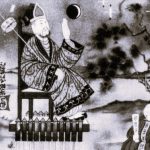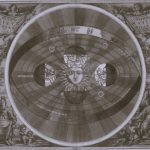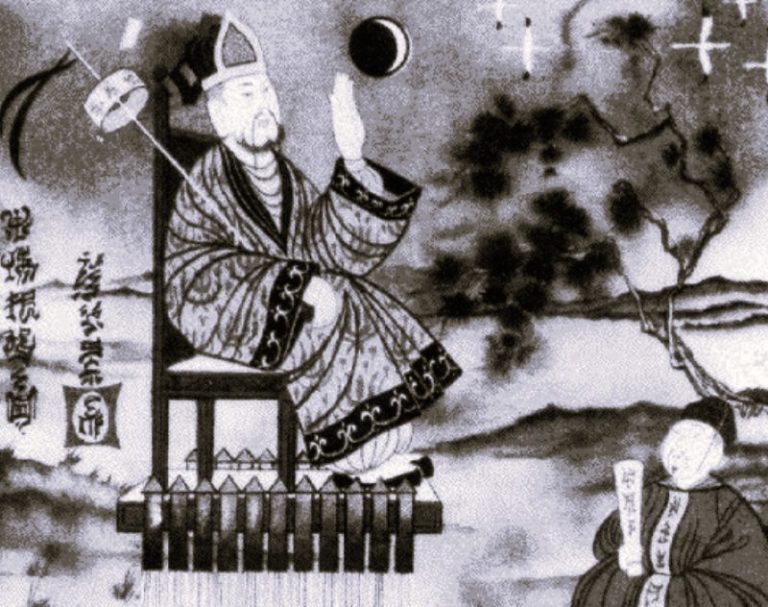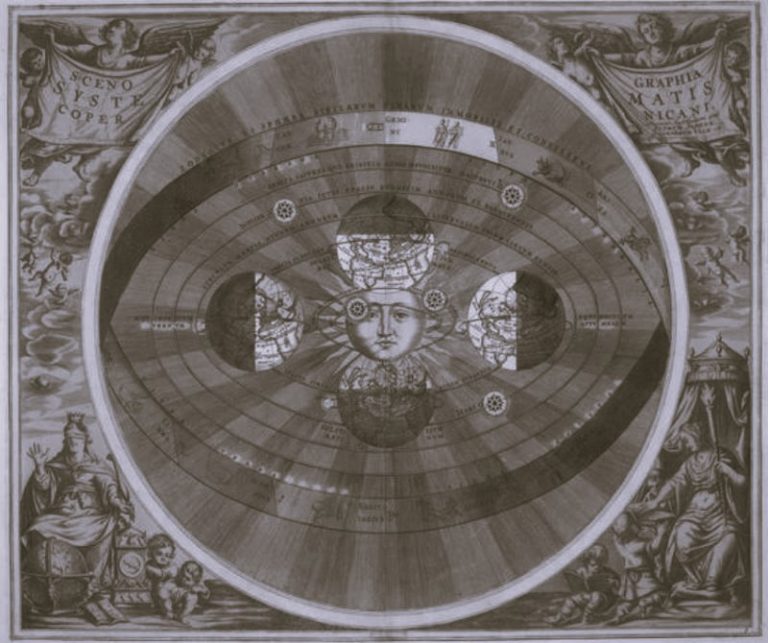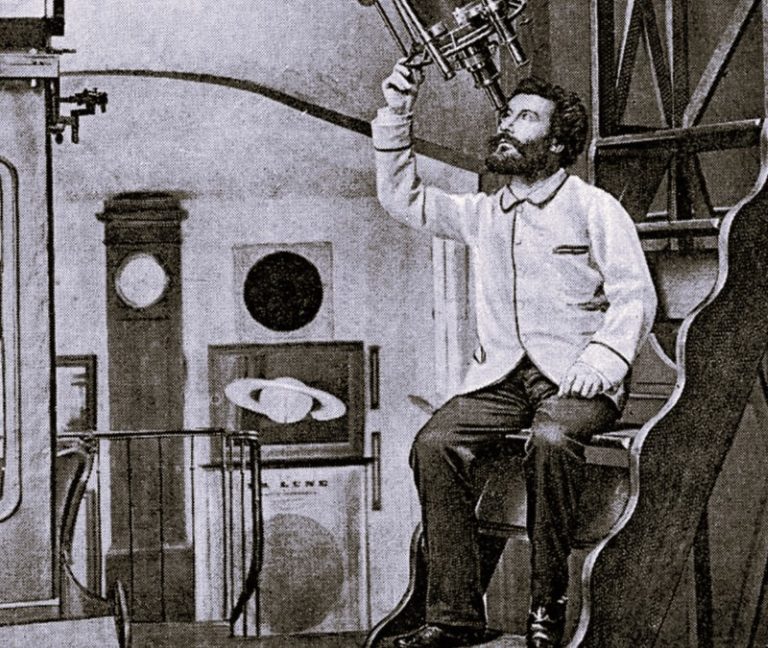
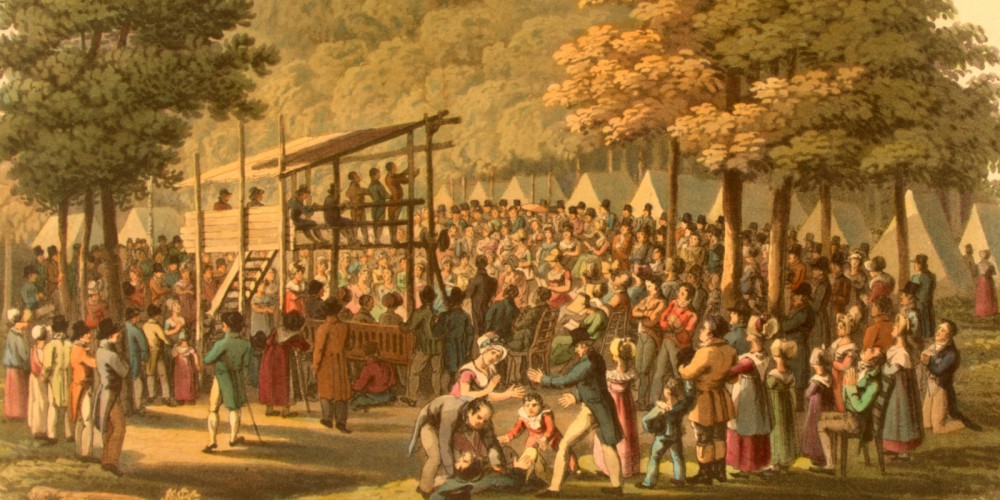
The problem with mixing religion and politics was that political issues became moral issues and, therefore, more difficult to deal with in the political process.

By Dr. David Goldfield
Robert Lee Bailey Professor of History
University of North Carolina, Charlotte
Evangelical religion and evangelical democracy reinforced each other in nineteenth-century America. The spread of evangelical Christianity and democracy across a continent justified the wars against Native Americans and Mexico, and provided the moral framework for the fight against slavery which many Americans came to see as incompatible with Protestant Christianity and democratic government. The problem with mixing religion and politics in this manner was that political issues became moral issues and, therefore, more difficult to deal with in the political process.
Most American historians chafe at the idea of American exceptionalism, equating the notion with arrogance or ahistoricism. The fact is, however, that the origin of the American republic was indeed unique, not only in the egalitarian sentiment expressed in its birth document, the Declaration of Independence, but also in America’s distinctive mixture of religious freedom and democratic government. At the time (1776) in Europe, state religion was no friend of liberal government. Dissenting religions functioned in a restrictive climate at best. Not so in America where religions operated freely in the market place of ideas. They competed on a relatively level playing field, even in those colonies where the Anglican Church was nominally the established denomination. Competitive religion guaranteed religious freedom. Accustomed to making up their own minds with respect to their souls, Americans applied that principle to their politics as well. Religious freedom and democratic government went hand-in-hand, the one reinforcing the other. At the same time, they were separate. Church and state did not mix in the American mind, especially among evangelical Protestants whose numbers grew after the Great Awakening of the 1740s. Evangelicals worried less about religion’s influence on government than about state intrusion into religion. Stand-alone religions remained free from the contamination of political influences and the moil of factional politics. Evangelicals took the Biblical admonition literally in Matthew 22:21, “Render unto Caesar the things which are Caesar’s, and unto God the things that are God’s.”
America, as the world’s first Enlightenment state, codified this sentiment first in the Virginia Statute for Religious Freedom (1779). The Statute begins with a strong Enlightenment sentiment: “Whereas Almighty God hath created the mind free . . . .” It attacks establishment, stating “that to compel a man to furnish contributions of money for the propagation of opinions which he disbelieves, is sinful and tyrannical,” and that, in fact, church and state are separate spheres, one independent of the other: “that our civil rights have no dependence on our religious opinions, any more than our opinions in physics or geometry.” Therefore, “be it enacted by the General Assembly, That no man shall be compelled to frequent or support any religious worship, place, or ministry whatsoever, nor shall be enforced, restrained, molested, or burdened in his body or good, nor shall other wise suffer on account of his religious opinions or belief; but that all men shall be free to profess, and by argument to maintain, their opinion in matters of religion, and that the same shall in no wise diminish, enlarge, or affect their civil capacities.” An extraordinary sentiment to become law in the late eighteenth-century world.
The Virginia Statute became the prototype for the First Amendment to the U.S. Constitution which established the principle of separation of Church and State on a national basis. Yet, that hardly ended the debate on the role of religion and politics in American life. A little more than a decade after the ratification of the Constitution, the members of a Baptist church in Danbury, Connecticut posed the question to Thomas Jefferson, the main author of the Virginia Statute and the inspiration for the First Amendment. Jefferson replied on January 1, 1802:
Believing with you that religion is a matter which lies solely between Man & his God, that he owes account to none other for his faith or his worship, that the legitimate powers of government reach actions only, & not opinions, I contemplate with sovereign reverence that act of the whole American people which declared that their legislature should “make no law respecting an establishment of religion, or prohibiting the free exercise thereof,” thus building a wall of separation between Church & State.
For Jefferson, the operational phrase was “wall of separation.” But even as he wrote his reply, a new religious revival was sweeping the nation that would sorely test this dictum. In a blaze of fervor known as the Second Great Awakening, evangelical Protestants radically transformed the religious landscape during the first half of the nineteenth century. A more popularly rooted Christianity moved outward and downward as it spread across frontier areas and converted marginalized and common folk. By 1850, one in three Americans was a regular churchgoer, a dramatic increase since 1800. The Baptists and Methodists, both spinning off numerous splinter groups, grew spectacularly and were the largest religious denominations by the 1820s. The key to their success was their ability to give religious expression to the popular impulse behind democratic reform. Especially in the backcountry of the South and West, where the first revivals occurred, itinerant preachers reshaped religion to fit the needs and values of ordinary Americans. The Lincolns, among hundreds of other frontier families migrating from Kentucky to Indiana, essentially followed the path of the revival, though young Abraham’s father, Thomas, adhered to an older form of Baptist Protestantism rooted in Calvinism which emphasized the basic sinfulness of mankind and the terror of an angry God. It was a much more humble Christianity than that promoted by the Second Great Awakening which heralded human agency as the handmaiden to God’s will.

Evangelical Christianity promoted by the Second Great Awakening emphasized personal, heartfelt experience that would produce a spiritual rebirth. Preaching became a form of theater, as a preacher and audience acted out scenes of damnation and salvation. The emotional force unleashed at the mass revivals known as camp meetings astounded observers. “The scene that then presented itself to my mind was indescribable,” recalled James Finley of the camp meeting at Cane Ridge, Kentucky in 1801: “At one time I saw at least five hundred swept down in a moment, as if a battery of a thousand guns had been opened upon them, and then immediately followed shrieks and shouts that rent the very heavens.” The evangelical religion of the traveling preachers was democratic in its populist rejection of traditional religious canons and its encouragement of organizational forms that gave a voice to popular culture. Salvation was no longer simply bestowed by an implacable God, as taught by the Calvinist doctrine of individual predestination. Ordinary people could now actively choose salvation, and this possibility was exhilarating. “Why, then, I can be saved!” exclaimed Jesse Lee upon hearing a Methodist preacher in Massachusetts. “I have been taught that only a part of the race could be saved, but if this man’s singing be true, all may be saved.” Evangelical churches bound the faithful into tightly knit communities that expressed and enforced local values and standards of conduct. They hymns borrowed melodies from popular music and were accompanied by fiddles and other folk instruments.
Evangelicalism was a religion of the common people, and it appealed especially to women and African Americans. The revivals converted about twice as many women as men. Excluded from most areas of public life, women found strength and comfort in the evangelical message of Christian love and equality. As the wife of a Connecticut minister explained, church membership offered women a welcome release from “being treated like beasts of burden [and] drudges of domineering masters.” In the first flush of evangelical excitement, female itinerant preachers spread the gospel up and down the East Coast. By thus defying social convention, these women offered a model of independent action. Other women organized their own institutions within denominations still formally controlled by men. Women activists founded and largely directed hundreds of church-affiliated charitable societies and missionary associations.
Evangelicalism also empowered black Americans. African American Christianity experienced its first sustained growth in the generation after the Revolutionary War. As a result of their uncompromising commitment to convert slaves, the Baptists and Methodists led the way. They welcomed slaves at their revivals, encouraged black preachers, and above all else, advocated secular and spiritual equality. Many of the early Baptist and Methodist preachers directly challenged slavery. In converting to Methodism, one slave stated, “from the sermon I heard I felt that God had made all men free and equal, and that I ought not be a slave.” Perceiving in it the promise of liberty and deliverance, the slaves received the evangelical gospel in loud, joyous, and highly emotional revivals.

But for all its liberating appeal to women and African Americans, evangelicalism was eventually limited by race and gender in much the same way as American democracy remained incomplete. Denied positions of authority in white-dominated churches and resentful of white opposition to integrated worship, free black northerners founded their own independent churches.
As increasing numbers of planters embraced evangelicalism after the 1820s, southern evangelicals first muted their attacks on slavery and then developed a full-blown religious defense of it based on the biblical sanctioning of human bondage. They similarly cited the Old Testament patriarchs to defend the unquestioned authority of fathers over their households, the masters of slaves, women, and children. Many popular religious sects in the North also used a particularist reading of the Bible to exalt the independence of white males at the expense of everyone else.
Still, the Second Great Awakening removed a major intellectual barrier to political democracy. Traditional Protestant theology, whether Calvinist, Anglican, or Lutheran, viewed the mass of humanity as sinners predestined to damnation and hence was loath to accept the idea that those same sinners, by majority vote, should make crucial political decisions. In rejecting this theology, ordinary Americans made a fundamental intellectual breakthrough. “Salvation open to all” powerfully reinforced the legitimacy of “one man, one vote.” Abraham Lincoln remained mostly untouched by the evangelical tide that washed over the nation. In fact, he doubted religion generally, having penned a weighty tome entitled, “On Infidelity,” in the mid-1830s, which expressed his skepticism about the existence of a Supreme Being or at least of the divinity of Jesus Christ. A friend and fellow attorney consigned the manuscript to the flames admonishing Lincoln to keep such thoughts to himself if he ever fancied a political career. Rumors of Lincoln’s unorthodox religious views swirled around his political campaigns in the 1830s and 1840s, though he was always quick to defuse such gossip. His wife, Mary Todd, was a devoted evangelical, but Lincoln himself never joined a church. Occasionally, Mary would drag him to a sermon, but it was not something he especially relished.
Given the rich religious imagery of his speeches and writings, Lincoln’s secularism seems puzzling. But it was commonplace at the time for Americans, even during casual conversations, to quote freely from Biblical texts or allude to Biblical themes. In an era when many homes had few books, everyone had at least one Bible, and its words and cadences became a lingua franca. Also, Lincoln’s views on religion evolved from the late 1840s onward. The death of a son in 1849 and the escalating sectional crisis over slavery played major roles. By the time of the Civil War, Lincoln’s skepticism had moderated significantly. But prior to the 1850s, Lincoln eschewed connections between religion and politics, and especially opposed American foreign adventures in the name of Manifest Destiny. He viewed the connection between evangelical religion and evangelical democracy with grave concern, especially as it seemed to give white Americans license to covet the lands of Mexicans and Native Americans.
After settling the area between the Appalachian Mountains and the Mississippi River, the American West of the early nineteenth century, migrants headed beyond the Mississippi River in the 1840s. The edge of settlement pushed into the Louisiana Purchase territory and across a huge area of plains, desert, mountains, and ocean coast that had seen few American settlers before 1840. The broad expanse of the trans-Mississippi region (stretching from the Mississippi Valley to the Pacific Coast) had become the new American West by mid-century. The West became a meeting ground of people from diverse cultures as Anglo-Americans came into contact and conflict with the Indians of the Plains and the Mexicans of the Southwest. Convinced of the superiority of their political and cultural values, Anglo-Americans asserted a God-given right to spread across the continent and impose their notions of liberty and democracy on peoples whose land they coveted. In the process, they defeated and subjugated those who stood in their way.

Manifest Destiny became the popular name for this impulse. John L. O’Sullivan, editor and Democratic politician, proclaimed in 1845 America’s “manifest destiny to overspread and to possess the whole of the continent which Providence has given us for the development of the great experiment of Liberty and federal self-government entrusted to us.” Central to Manifest Destiny was the assumption that white Americans were a special people, a view that dated back to the Puritans’ belief that God had appointed them to establish a New Israel cleansed of the corruption of the Old World. Evangelical revivals in the early nineteenth century then added an aggressive sense of urgency to America’s presumed mission to spread the benefits of Protestantism and Christian civilization. Protestant missionaries, as in Oregon, were often in the vanguard of U.S. expansion.
What distinguished the special U.S. mission as enunciated by Manifest Destiny was its explicitly racial component. Between 1815 and 1850, the term Anglo-Saxon, originally loosely applied to English-speaking peoples, acquired racial overtones, in keeping with the then-current interest of European and American scientists in defining, classifying, and ranking human races (with themselves, of course, at the top). Caucasian Anglo-Saxon Americans, as the descendants of ancient Germanic tribes that had purportedly brought the seeds of free institutions to England, were now said to be the foremost race in the world. The superior racial pedigree they claimed for themselves gave white Americans the natural right to expand westward, a chosen people carrying the blessings of democracy and progress. Only they, it was argued, had the energy, industriousness, and innate love of liberty to establish a successful free government.
Advocates of Manifest Destiny insisted that U.S. expansion would be irresistible and peaceful. They were not warmongers calling for conquest. Still, the doctrine was undeniably a self-serving justification for what other peoples would see as territorial aggrandizement. Certainly, this was true of the Mexican Americans and Native Americans who lost land and cultural independence as they were brought under American control. Manifest Destiny and popular stereotypes lumped Indians and Mexicans together as inferior peoples. An emigrant guide of 1845 spoke of the Mexican Californians as “scarcely a visible grade in the scale of intelligence above the barbarous tribes by whom they were surrounded.” For Waddy Thompson, a U.S. diplomat minister in Mexico in the early 1840s, the Mexicans in general were “lazy, ignorant, and, of course, vicious and dishonest.” This alleged Mexican inferiority was attributed to racial intermixture with the Indians, who, it was said, were hopelessly unfit for civilization. Plus, they were Roman Catholic, another indication of weakness, this of the mind as their religion compelled them to slavishly follow a foreign authority to the detriment of their national interests.
The historic Protestant animus against the Roman Catholic Church heightened in the 1830s with large-scale Irish Catholic immigration to the U.S. Although few questioned the right of Catholics to emigrate and to practice their religion in the U.S., many evangelicals perceived the Church as a Fifth Column threatening American democracy. In addition, Irish immigrants competed with Protestants for housing and entry-level jobs in the nation’s growing cities.
From 1834, when a Protestant mob burnt a convent to the ground outside Boston, until the beginning of the Civil War, sectarian strife periodically erupted into violence on the streets of urban America. Rival Protestant and Catholic gangs fought over turf and politics, Catholics supporting Democrats and Protestants Whigs and later Republicans. Irish Catholics bore the brunt of this persistent anti-Catholic sentiment. The desertion of Irish Catholic soldiers to Mexico during the Mexican War, the competition with Catholic missionaries in the West, and the aggressive stance of the Vatican toward conversion and placing limits on Protestant access to worship in Rome, fueled evangelical prejudices.


The millennial idea of cleansing the world of sin meant extending the reign of the Protestant faith across the globe as the true religion of Christ. For many northern evangelicals, the Catholic faith was just another form of slavery, and slavery in any guise was abhorrent. By the late 1840s, as Irish immigration accelerated in the wake of the Irish potato famine, bloody election day clashes became commonplace. As sectarian strife polluted the political arena, slavery grew as an equally important political issue with equally strong religious overtones.
In an era of evangelical fervor it was inevitable that slavery would assume a religious meaning, and when it intruded into the political process, it became less a political issue than a matter of theology. Once that occurred, it was difficult to compromise or temporize the issue, for how do you parse sin? Slavery polarized politics because it became infused with religious connotations. Southerners invoked the Bible to defend slavery, and northern evangelicals condemned the institution as a violation of Christian ethics if not the literal word of the Bible. The most emphatic word in this debate came not from any divine, but from the pen of a woman with a broken heart. Eventually, slavery would eclipse the sectarian conflict as the focus of evangelical concern.
Eliza Cabot Follen, a poet and abolitionist, had written to her friend, Harriet Beecher Stowe inquiring how she came to write Uncle Tom’s Cabin. Stowe replied:
I had two little curly headed twin daughters to begin with and my stock in this line has gradually increased, till I have been the mother of seven children, the most beautiful and the most loved of whom lies buried near my Cincinnati residence. It was at his dying bed and at his grave that I learned what a poor slave mother may feel when her child is torn away from her. In those depths of sorrow which seemed to me immeasurable, it was my only prayer to God that such anguish might not be suffered in vain . . . . I allude to this here because I have often felt that much that is in that book had its root in the awful scenes and bitter sorrow of that summer. It has left now, I trust, no trace on my mind except a deep compassion for the sorrowful, especially for mothers who are separated from their children.
Harriet Beecher Stowe’s roles as a wife and a mother had influenced her perception of slavery and inspired her writing. Her beloved son had died of cholera in 1849; that wrenching event, coupled with the passage of the Fugitive Slave Act a year later, galvanized Stowe to pour her grief and indignation into a novel about plantation slavery. Slavery was an abstract concept to most white northerners at the time. Stowe personalized it in a way that made them see it as an institution that did not just oppress black people but also destroyed families and debased well-meaning Christian masters. The deep piety expressed in the letter permeated the book and changed people’s moral perceptions about slavery.
Stowe had grown up in a family of evangelical Protestant ministers and abolitionists. Her father, Lyman Beecher, was a prominent evangelical reformer. He had taken his family west from New England in the early 1830s to save the new territories from the Roman Catholic Church. Anti-Catholicism and anti-slavery often went hand-in-hand among northern evangelicals. Both, in their view, represented unnatural limits on human endeavor and reason. All six of Beecher’s sons became ministers. In Beecher’s view, evangelical Christianity erased the line between public and private. Personal and societal salvation were closely connected. Uncle Tom’s Cabin touched upon many of the evangelical themes current in mid-nineteenth-century America: the broken family, the denial of freedom, and the Christian martyr. And the depiction of southern masters struggling unsuccessfully with their consciences focused public attention on how slavery subverted Christianity.
The book created a sensation in the United States and abroad selling 10,000 copies in its first week and 300,000 within a year. By the time of the Civil War, it had sold an unprecedented 3 million copies in the U.S. and tens of thousands more in Europe. Stowe’s book gave slavery a face; it changed people’s moral perceptions about the institution in an era of deep Protestant piety; it was a Sermon on the Mount for a generation of northerners seeking witness for their Christianity and a crusade on behalf of their faith. Black northerners embraced Uncle Tom’s Cabin. Frederick Douglass declared that the book was “a work plainly marked by the finger of God.” Abraham Lincoln chided Stowe when she visited him at the White House in 1862 that she was the “little woman” who had started the Civil War.

It was not yet clear, however, whether evangelicals would precipitate a sectional war or a sectarian conflict. A new political party emerged, the Know-Nothing Party in response to the flood of Irish immigrants into cities in the northern and border states after 1848. Its name derived from the reply that members gave when asked about the party: “I know nothing.” Know-Nothing candidates fared surprisingly well in local and congressional elections during the fall of 1854, carrying 63 percent of the statewide vote in Massachusetts and making strong showings in New York and Pennsylvania. In several states and cities, they passed legislation barring Catholics from public office and unsuccessfully sought to increase the time required for an immigrant to become a citizen from one year to 21 years. The Know-Nothings also fostered anti-Catholic violence, such as the bloody election day riot that erupted in Louisville, Kentucky, in 1855. A few Know-Nothings called for drastic measures to restore order and preserve the integrity of the ballot box. William Brownlow, a Philadelphia editor, declared, “We can have no peace in this country until the CATHOLICS ARE EXTERMINATED.” A delegation of Know-Nothings called upon Lincoln in his Springfield, Illinois law office. Though he was polite, Lincoln eventually turned down their invitation to join the new party. He felt that once the government singled out one religious group for persecution, other religions were at risk as well. Besides, such religious prohibitions violated the First Amendment to the Constitution. The Know-Nothings eventually disintegrated as a party. Nevertheless, this was a constituency that Lincoln would have to deal with as many former Know-Nothings moved over to the new Republican Party.
Although Lincoln left politics after his term in Congress in 1849. The Kansas-Nebraska Act of 1854, which repealed the Missouri Compromise, brought him back into the political arena. For Lincoln, slavery was always a moral issue, though he kept most of those thoughts to himself. As a constitutionalist he remained opposed to tampering with the institution where it already existed. The Kansas-Nebraska Act potentially opened up all of the territories acquired from Mexico during the Mexican-American War to slavery, thus unfairly, in his view, reducing the opportunities for white men to succeed in these new lands. But with the Dred Scott decision of 1857, Lincoln’s animus toward slavery, its extension, and even its existence grew. The decision declared laws of states and territories barring slavery unconstitutional since these laws deprived citizens of their property (slaves) without the due process of law guaranteed by the Fifth Amendment to the U.S. Constitution. In effect, the decision nationalized slavery.
Lincoln decided to stand for the U.S. Senate in Illinois in 1858. Accepting the Republican nomination, Lincoln employed a technique that he had frequently used in his political speeches: adapting a Biblical passage to political ends. The Biblical passage came from Matthew 12:25: “Every kingdom divided against itself is brought to desolation; and every city or house divided against itself shall not stand.” In his paraphrase addressing recent events, he declared, “A house divided against itself cannot stand. I believe this government cannot endure, permanently, half slave and half free. I do not expect the Union to be dissolved—I do not expect the house to fall—but I do expect it will cease to be divided. It will become all one thing or all the other. Either the opponents of slavery will arrest the further spread of it, and place it where the public mind shall rest in the belief that it is in the course of ultimate extinction; or its advocates will push it forward, till it shall become alike lawful in all the States, old as well as new—North as well as South.”

Lincoln believed that this confrontation was now inevitable. Though he hoped the conflict could be solved peacefully, given the growing intransigence of both sides and given the moral dimensions of the issue, it was difficult to see how the political process could contain the controversy. Slavery had become for Lincoln and for many white northerners a moral issue that transcended politics.
The democratic process is often a messy business: campaigns are noisy, chaotic affairs, long on show and often short on substance; Congress moves slowly when they move, often clashing with the President; and major issues often get resolved through compromise, leaving neither party entirely satisfied, but everyone happy with some part of it. The intrusion of religion renders these compromises difficult. For how can one compromise with sin? Stowe’s Uncle Tom’s Cabin reserved much of its invective for northern politicians who temporized on the slavery issue, who voted for the Compromise of 1850, and who (like Lincoln) ignored its presence in the southern states. Without compromise, a democratic government will fall apart. A house divided against itself cannot stand.
The Republican Senatorial candidate took this perspective to the famous debates against his Democratic Party opponent, Stephen A. Douglas. For Douglas, slavery was not a moral issue. What mattered was what white people wanted. If they wanted slavery, fine; if they did not, fine also. Lincoln had a different view which he articulated best in the final debate:
The real issue in this controversy . . . is the sentiment on the part of one class that looks upon the institution of slavery as a wrong, and of another class that does not look upon it as a wrong . . . . The Republican party . . . look[s] upon it as being a moral, social and political wrong . . . and one of the methods of treating it as a wrong is to make provision that it shall grow no larger . . . . That is the real issue . . . . It is the eternal struggle between these two principles, right and wrong, throughout the world.
Lincoln at once raised the political stakes and expanded the significance of the slavery controversy from an American to a global context. In the context of an evangelical religious revival, Lincoln’s assertion reinforced the perception that the nation, as prefigured in the Book of Revelation, was approaching a crossroads, not only a secular divide, but a battle that could determine the future of mankind for eternity: “As I view the contest,” he asserted, “it is not less than a contest for the advancement of the kingdom of Heaven or the kingdom of Satan.” The difficulty with raising the stakes of an election so high is that it threatened to polarize the electorate so that one side or the other could find the results of a democratic election totally unacceptable. For how do you compromise with the devil? Lincoln lost that Senatorial election when Illinois voters returned a Democratic majority to the state legislature (in those days, state legislatures elected U.S. Senators). Nevertheless, his eloquence attracted notice among Republicans around the North and he secured his party’s presidential nomination in 1860. With the Democrats divided into northern and southern factions, Lincoln became the sixteenth president of the U.S. in November 1860.
Writing to a friend in Illinois in December 1860 as South Carolina prepared to secede from the Union, the President-elect stated, “The tug has to come, & better now, than any time hereafter.” There is nothing in his private or public statements over the next three months that hinted at compromise. When Confederate troops fired on Fort Sumter in April 1861, the Civil War was underway.
Lincoln believed that this war for the Union as God’s war: to save the American experiment for the benefit of all mankind. This global, messianic perspective characterized his thinking on the war through the end of 1862. In his annual message to Congress (what today we call the State of the Union Address) in December 1862, Lincoln used the language of both evangelical Christianity and evangelical democracy to characterize the Federal war effort which, by that time, included the emancipation of four million slaves:
The fiery trial through which we pass, will light us down, in honor or dishonor, to the latest generation . . . . In giving freedom to the slave, we assure freedom to the free . . . . We shall nobly save, or meanly lose, the last best hope of earth. Other means may succeed; this could not fail. The way is plain, peaceful, generous, just—a way which, if followed the world will forever applaud, and God must forever bless.
The awful carnage of the war, however, took its toll both on Lincoln and on his certitude of the righteousness of the Union cause. The evangelical promise that the U.S. was beyond history seemed horribly mistaken as the nation fractured in fratricidal warfare. That a war so bloody should be visited upon the nation bespoke of an unspeakable sin that required a drastic expiation, a sin for which both sides, North and South, were equally culpable. No longer certain of God’s design in this war; no longer certain of which side God favored, Lincoln turned on both evangelical theology and evangelical democracy in his Second Inaugural Address delivered March 4, 1865. The self-righteousness of both sides had precipitated this bloody conflict. It was time for humility and reflection so that such a catastrophe would never happen again. This was the tone of the Second Inaugural Address, a tone that startled and even angered some listeners who expected a triumphal speech now that Union troops were nearly at the gates of Richmond, Virginia, the Confederate capital.
Lincoln dismissed the good military news quickly and declined to foretell the victory that was seemingly inevitable by that point: “The progress of our arms . . . is as well known to the public as to myself, and it is, I trust, reasonably satisfactory and encouraging to all. With high hope for the future, no prediction in regard to it is ventured.” Instead, he groped rhetorically to find meaning for the war, less as an Armageddon than as a cleansing of sin; less as an indictment of the rebellious South, than as an accounting of national sins; less as the salvation for all mankind, than as a sobering lesson for America. It was a more muted, more introspective analysis of the war than he had ever offered. It was more a sermon than an inaugural address.
“Neither party,” Lincoln explained, “expected for the war the magnitude or the duration which it has already attained. Neither anticipated that the cause of the conflict might cease with or even before the conflict itself should cease,” he explained in a reference to slavery and emancipation.
There is no specific blame here, rather an awareness of everyone’s complicity. Nor, Lincoln noted, can there be any specific religious meaning derived from the conflict beyond the fact that we cannot know God’s intentions, a perspective that represented a major departure from evangelical theology. “Both read the same Bible and pray to the same God, and each invokes His aid against the other.” Even though southerners prayed to preserve slavery, “let us judge not, that we be not judged.” God has not favored either side: “The prayers of both could not be answered. That of neither has been answered fully. The Almighty has His own purposes.”
If slavery was the sin that caused this awful conflict, it was a sin of all, not only of the South. “If we shall suppose that American slavery is one of those offenses which, in the providence of God, must needs come, but which, having continued through His appointed time, He now wills to remove, and that He gives to both North and South this terrible war as the woe due to those by whom the offense came, shall we discern therein any departure from those divine attributes which the believers in a living God always ascribe to Him?”
Lincoln would not venture to predict the war’s end because he felt the result and the timing were in God’s hands and hence incomprehensible. Man cannot say when sin is expiated. “Yet, if God wills that it [the war] continue until all the wealth piled by the bondman’s two hundred and fifty years of unrequited toil shall be sunk, and until every drop of blood drawn with the lash shall be paid by another drawn with the sword, as was said three thousand years ago, so still it must be said ‘the judgments of the Lord are true and righteous altogether.’” Looking forward and renouncing retribution as something for God, not man, Lincoln urged the country to heal without revenge. “With malice toward none, with charity for all, with firmness in the right as God gives us to see the right, let us strive on to finish the work we are in, to bind up the nation’s wounds, to care for him who shall have borne the battle and for his widow and his orphan, to do all which may achieve and cherish a just and lasting peace among ourselves and with all nations.”
At the White House reception following the inauguration, Lincoln sought ought the great black abolitionist, Frederick Douglass, for his opinion of the address. Douglass simply pronounced it “a sacred effort.” In many respects, the Second Inaugural prefigured the rapid decline of evangelical religion in postwar American public policy. The self-righteous trumpeting of the prewar era diminished considerably. The more than 650,000 deaths (not counting civilians) underscored the implications of dividing issues and people into the “saved” and the “damned.” The certitude of mankind’s perfection met its demise on the battlefields of Antietam and Gettysburg and of dozens of other lesser venues. Such postwar disillusionment is not uncommon—witness the aftermath of World War I.
But Abraham Lincoln’s greatness was due, in part, to his wonderful ability to capture in rhetoric what the American people were thinking. The arc of his religious awakening epitomizes this ability. Initially untouched by the Second Great Awakening, Lincoln’s religious sensibilities emerged following the death of his son in 1849 and the subsequent controversy over the extension of slavery in the territories. Perhaps, like Harriet Beecher Stowe, he equated in his own mind the loss of a loved one with the loss slaves felt over the sale of their kin. Slavery was certainly a moral issue, but in the volatile mixture of religion and politics, a democratic society could not contain the politics of God, and men and women suffered.
Bibliography
- Baker, James T., ed. Religion in America: Primary Sources in U.S. History. Belmont, CA: Thomson Wadsworth, 2006.
- Carwardine, Richard J. Evangelicals and Politics in Antebellum America. New Haven, CT: Yale University Press, 1993.
- ——. Lincoln: A Life of Purpose and Power. London: Pearson, 2003.
- Guelzo, Allen C. Abraham Lincoln: Redeemer President. Grand Rapids, MI: William B. Eerdmans, 1999.
- Hedrick, Joan D. Harriet Beecher Stowe: A Life. New York: Oxford University Press, 1994.
- Long, Kathryn Teresa. The Revival of 1857–58: Interpreting an American Religious Awakening. New York: Oxford University Press, 1998.
- Miller, Randall M., Harry S. Stout, and Charles Reagan Wilson, eds. Religion and the American Civil War. New York: Oxford University Press, 1998.
- Mintz, Steven. Moralists and Modernizers: America’s Pre-Civil War Reformers. Baltimore: Johns Hopkins University Press, 1995.
- Noll, Mark A. America’s God: From Jonathan Edwards to Abraham Lincoln. New York: Oxford University Press, 2002.
- ——, ed. Religion and American Politics: From the Colonial Period to the 1980s. New York: Oxford University Press, 1990.
- ——, ed. God and Mammon: Protestants, Money, and the Market, 1790–1860. New York: Oxford University Press, 2002.
- Snay, Mitchell. Gospel of Disunion: Religion and Separatism in the Antebellum South. New York: Cambridge University Press, 1993.
- Stout, Harry S. Upon the Altar of the Nation: A Moral History of the Civil War. New York: Viking, 2006.
- Swift, Donald C. Religion and the American Experience. Armonk, NY: M.E. Sharpe, 1998.
- White, Jr., Ronald C. Lincoln’s Greatest Speech: The Second Inaugural. New York: Simon & Schuster, 2002.
- Wills, Garry. Under God: Religion and American Politics. New York: Simon & Schuster, 2007.
- Woodworth, Steven E. While God Is Marching On: The Religious World of Civil War Soldiers. Lawrence, KS: University of Kansas Press, 20
Originally published by the American Studies Journal 53 (2009), DOI 10.18422/53-03, under the terms of a Creative Commons Attribution-ShareAlike 3.0 Unported license.
